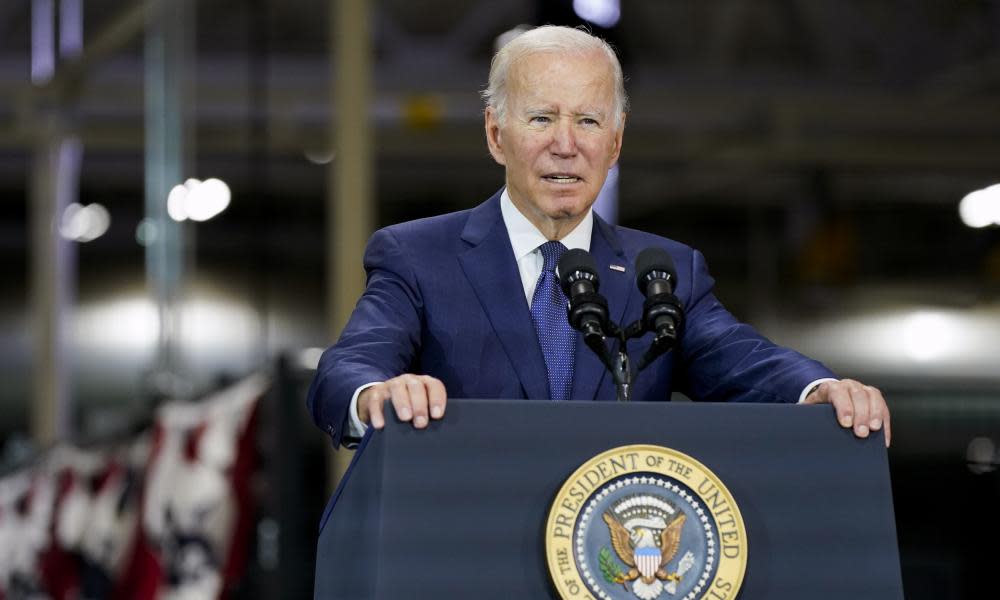Biden’s ‘Armageddon’ warning wasn’t based on new intelligence, US says

The White House has said that Joe Biden’s warning of “Armageddon” if Russia uses a nuclear weapon in Ukraine was not based on any new intelligence suggesting such nuclear use is imminent.
The US president issued his warning at a private fundraising event in New York on Thursday evening, in his most outspoken remarks yet on the threat of wartime nuclear weapons being used for the first time since 1945.
Biden described the current standoff over Ukraine, with Vladimir Putin threatening to use all means at his disposal to defend Russia and the territory it has seized in Ukraine, as the most dangerous nuclear moment since the Cuban missile crisis 60 years ago this month.
Related: All you wanted to know about nuclear war but were too afraid to ask
“He is not joking when he talks about the potential use of tactical nuclear weapons,” Biden told donors. “I don’t think there’s any such thing as an ability to easily use a tactical nuclear weapon and not end up with Armageddon.”
The remarks marked a departure from Biden’s normally cautious tone in response to Putin’s threats, but the White House spokeswoman, Karine Jean-Pierre, said on Friday they did not reflect any new intelligence from the Ukraine conflict, adding that there was no information of Russia preparing to “imminently” use nuclear weapons.
“The president was speaking about concerns about Putin’s threats to use nuclear weapons,” Jean-Pierre said. “We have not seen any reason to adjust our own strategic nuclear posture, nor do we have indications that Russia is preparing to imminently use nuclear weapons.”
European leaders reacted cautiously to Biden’s use of stark vocabulary. Emmanuel Macron was critical when asked about the issue, saying he would not enter into political fiction
“We must speak with prudence when commenting on such matters,” Macron said.
Asked if she shared Biden’s view, the president of the European Commission, Ursula von der Leyen, said: “We are taking the threats of President Putin very seriously.” She added that at the same time, “we are not being blackmailed by what he says. We have a clear stance on how to proceed.”
She was speaking the day after leaders from 44 European countries met in Prague to discuss the war in Ukraine.
Charles Michel, the president of the European Council, said that gathering had shown strong determination to support Ukraine and “firmness in our condemnation of Russia”. He said: “We take the threat and all threats of any escalation very seriously … [but] we don’t intend to be intimidated.”
Speaking to the BBC, the Ukrainian president, Volodymyr Zelenskiy, said that he did not think that the Kremlin was ready to use nuclear weapons but had begun to prepare the Russian population for such an eventuality.
“That’s very dangerous,” he said. “I think it’s dangerous to even speak about it.”
It is unclear whether Biden was speaking loosely because of the relatively private setting of Thursday’s Democratic senatorial fundraiser, although some journalists were present, or whether he intended to send a deterrent message to Putin.
Related: Are Putin’s nuclear threats really likely to lead to Armageddon?
“I think Biden’s comments were NOT just running his mouth off,” James Acton, co-director of the nuclear policy programme at the Carnegie Endowment for International Peace, wrote on Twitter. “He’s responsible for the safety of hundreds of millions of people during an actual nuclear crisis. His comments tell us about his focus right now.”
Acton said it was misguided to assume that the threat of annihilation was a relic of the cold war and that the probability that Russia would use a tactical weapon in Ukraine, if Putin did resort to nuclear use, meant that escalation would be contained.
“I’m not someone who thinks escalation within a nuclear war is inevitable, but neither am I terribly sanguine about the prospects for managing it,” Acton said. “After all, we have exactly zero experience of managing nuclear escalation against a nuclear-armed power and so we have little reason for confidence.”

 Yahoo Movies
Yahoo Movies 
